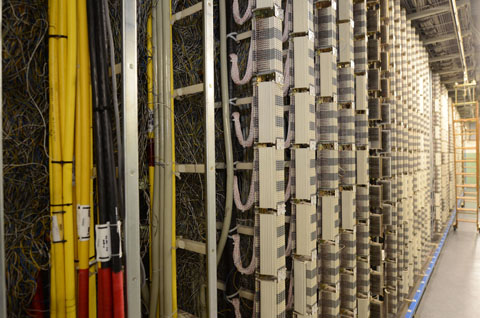It will be the first operator in the world to make the shutting down of its copper switchboards a reality
- Spain is at the forefront of Europe in the deployment of ultra-fast broadband and digitalization thanks to the boost that Telefónica has given to the deployment of fibre and the migration of its customers to this new technology.
- A fibre switchboard provides service to the equivalent of four copper switchboards.
- Fibre access technology takes up 15% of the space taken up by copper access.
- The shutting down of copper means 60% energy savings.
- Telefónica has encouraged all its customers passing to fibre in order to improve their service experience and to place them in a better position regarding the digital future.
Madrid, 7 June 2018.- Telefónica advances in its network transformation process which involves the shutting down of a copper switchboard a day until 2020, thus covering the shutdown milestone set of 653 copper switchboards in 2020, 253 of which will occur this year, 200 in 2019, and 200 more in 2020.
As highlighted by Pablo Ledesma, Director of Operations of Telefónica Spain, “fibre is the access technology that will support the development of the services and customers of the next 100 years, and Telefónica is working on the evolution of copper to fibre, and enabling network transformation and simplification processes. In fact, Spain is at the forefront of Europe in the deployment of ultra-fast broadband and digitalization thanks to the boost that Telefónica has given to the deployment of fibre and the migration of its individual and company customers to this new technology”.
The objective of this transformation plan is to complete the fibre coverage with a totally digital network, and to encourage all customers to pass to fibre, thus improving their services experience and placing them in a better position regarding the digital future. Numerous opportunities that stem from this objective are related to the reduction of space as well as environmental efficiency (energy savings and components recycling).
To manage this process, Telefónica, European benchmark in Fibre access, has developed the FARO project which encourages the passing of customers to fibre, and industrializes the shutting down of copper in entire switchboards.
Within the framework of the FARO project, the optimization of infrastructure and space is worth mentioning when changing copper for fibre, thus resulting in a lower cross-section but greater capacity. Thus, a 2,400 pair copper harness provides service to 2,400 customers, while a 256 wire fibre cable provides service to 16,384 customers. In addition, a fibre switchboard provides service to the same number of accesses as those provided from four copper switchboards, and fibre access technology only occupies 15% of the space occupied by copper access.
To all of this, the energy savings involved in the shutting down of copper must be added. These energy savings can reach 60%, in addition to the adequate management of the waste and disassembled materials with the recovery of some of them that can be used as spare parts, or the recycling of others through authorized companies, with the sustainability that all of this implies.
In parallel to the development of the FARO program, Telefónica is executing the simplification project through network plans that seeks the optimization and compacting of the copper legacy elements. This makes it possible to implement an energy efficiency and space, and circular economy, model with reutilization and recycling.
